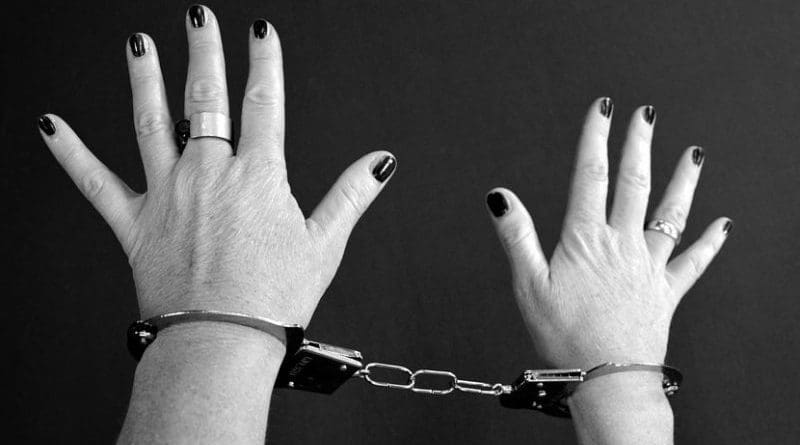Human Trafficking Is Thriving During COVID-19: Here’s What Governments Should Do – OpEd
As the effects of the coronavirus rage on, the increase in human trafficking has become one of the most devastating effects of the world’s response to the pandemic. According to various activist groups, academics, and officials, factors ranging from lockdowns and job losses to border closures have undone much of the global gains in tackling human trafficking in recent years.
Despite restrictions on travel and movement across borders, traffickers have found ways of continuing their malicious trade and in many instances expanding it. Experts have observed human trafficking being driven increasingly underground and a growth in violent control used against victims to ensure successful transit.
In order for the lucrative trade to continue, traffickers have developed methods to expand their reach through internet communications. As in-person interaction becomes more and more uncommon, the world has shifted dramatically to the web. This has created significant opportunities for smugglers to entrap potential victims, lure them to capture, and otherwise seduce them. This has been especially seen in the increase of attempts to lure children and groom them for online sexual exploitation.
Not only has the human trafficking industry found ways of overcoming new hurdles, in many ways, but the new COVID reality has also benefitted smuggling and similar crimes. Simply put, the pandemic has impacted the capacity of both governments and NGOs to combat the trafficking phenomenon. With administrative, law enforcement, and in many cases even military resources being used for COVID related projects and missions, little has been left to address other vital issues.
The closing of legal travel between countries has also had a negative impact. Humanitarian groups have reported that many migrant workers in South East Asia and other locations have had to remain in their countries of employment. Unable to return home, many have been detained and forced to continue working against their will.
The coronavirus and the world’s response is making vulnerable people more vulnerable. Often traffickers offer enormous financial and material incentives to individuals in order to obtain their assistance in smuggling and lure them into captivity. The lockdowns and the ensuing lack of work in many countries along trafficking routes has made many more people vulnerable to criminal activity.
In addition to the increase in smuggling incidents, efforts to provide for rescued victims of human trafficking have been severely impeded. “Lockdowns have also meant that survivors have been unable to access rehabilitation, welfare, and support services vital to their recovery. NGOs and charities are struggling with increased need for their services, while coping with less funding”, said Ryna Sherazi, Spokeswoman for Anti-Slavery International.
The biggest boost to trafficking, however, has come from the huge increase in the pool of both victims and participants. Like most of the consequences triggered by the pandemic, this rise in criminal activity is rooted in economics.
Globally, the coronavirus pandemic has created unprecedented unemployment rates in even the most economically sound countries. In countries with less stable job markets, the situation is exponentially worse. Africa has been hit the hardest, as more and more jobs are being lost every day across the continent. And this has spelled disaster for the fight against human trafficking.
Sadly, Africa has for years been home to some of the most extensive human trafficking routes. All countries in the northern region of Africa serve as a source, transit, and destination countries for trade in human beings. On the continent itself, it is estimated that some 9.24 million individuals are enslaved, making up twenty-three percent of the enslaved population. Most routes originate from the Horn of Africa. Some move northwest toward the Sinai Peninsula. Others are directed to the northeast in the direction of Yemen and Saudi Arabia. The ‘southern route’ as it is known, takes victims through Kenya and other central African nations such as the Congo.
While the drivers behind the African trafficking trade are varied, effects stemming from the pandemic have become major factors. The crushing economic downturn in African countries has produced new recruits for smuggling rings and more potential victims ripe for exploitation. In South Africa in particular, a major hub for human cargo, official sources have recorded that a staggering 30 percent of workers have been left jobless bringing the country’s total number of unemployed to around 7 million. Rampant homelessness, lack of access to resources, and all but complete abandonment by their governments have led to the desperation of hundreds of thousands of citizens. It is not surprising then that South Africa is experiencing more difficulty in combating human trafficking as well as caring for victims of smuggling.
Despite the persistent concerns around public health, governments must take notice of the current spike in human trafficking. It is essential that authorities address the growing vulnerabilities of exploitation that is feeding the trafficking industry. Only by stemming the root causes can populations be protected from becoming victims as well as the lures of participation. Essential services including welfare centers, rehabilitation facilities, and shelters must be kept well-funded and operating to ensure victims of this unspeakable crime remain cared for.
*Sofia Pedersen is a geopolitical analyst based in Copenhagen currently working as an independent contractor and a fellow to a new think tank, Jensen Research Center for Policy Reform

